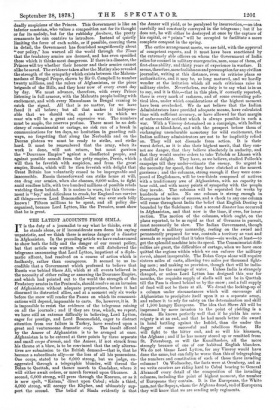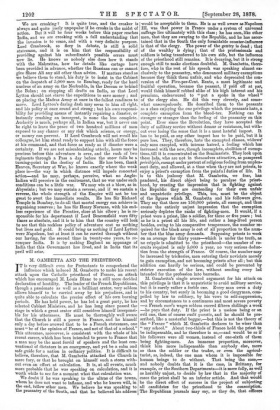THE LATEST ACCOUNTS FROM SIMLA.
TT is the duty of a journalist to say what he thinks, even if I he stands alone, or if inconsiderate men deem his saying unpatriotic, and we think there is serious danger of a disaster in Afghanistan. In the preceding article we have endeavoured to show both the folly and the danger of our recent policy, but that article was written while we still disbelieved the telegrams announcing that Lord Lytton, impatient of a diplo- matic affront, had resolved on a course of action which is foolhardy, rather than courageous. It seemed to us in- credible that a Government which professed to believe that Russia was behind Shere Ali, which at all events believed in the necessity of either ruling or annexing the Douranee Empire, and which had pointed out to the world the strength of the Feudatory armies in the Peninsula, should resolve on an invasion of Afghanistan without adequate preparations, before it had -disarmed its distrusted allies, and at a moment only six weeks before the snow will render the Passes on which its communi- cations will depend, impassable to carts. So, however, it is. It is impossible to resist the evidence of the telegrams raining on all the journals ; and if they are true, which, we repeat, we have still an extreme difficulty in believing, Lord Lytton, eager for prestige, and Lord Beaconsfield, eager to distract attention from our failure in Turkey, have resolved upon a great and venturesome dramatic coup. The insult offered by the Ameer of Afghanistan is to be avenged at once. Afghanistan is to be entered at three points by three separate and small corps d'arme'e, and the Ameer, if not struck from his throne at a blow, is to be convinced that the only alterna- tives are submission to the British demand—that is, that he become a subordinate ally—or the loss of all his possessions. One corps, stated to be 8,000 strong, but we judge, ex- aggerated through a telegraphic blunder, will thread the Bolan to Quettah, and thence march to Candahar, where it will either await orders, or march forward upon Ghuznee. A second, 6,000 strong, will press through the Koorum, or as it is now spelt, "Karam," direct upon Cabul ; while a third, 4,000 strong, will occupy the Khyber, and ultimately sup- port the second. The belief at Simla evidently is that
the Ameer will yield, or be paralysed by insurrection,—an idea carefully and constantly conveyed in the telegrams ; but if he does not, he will either be destroyed at once by the capture of his capital, or "points" will be occupied to facilitate a more complete conquest in the spring.
The entire arrangement meets, we are told, with the approval of competent experts, and it must have been sanctioned by the extremely able officers on whom the Government of India relies for counsel in military emergencies, men, some of them, of first-class ability, and thirty years of experience in warfare. It seems, therefore, mere foolishness and presumption for any civilian journalist, writing at this distance, even to criticise plans so authoritative, and it may be, so long matured, and we hardly wonder at the irritation which all such criticisms raise in military circles. Nevertheless, our duty is to say what is in us to say, and it is this,—that in this plan, if correctly reported, there is every mark of rashness, and of some overruling poli- tical idea, under which considerations of the highest moment have been overlooked. We do not believe that the Indian Administrators have provided adequate means, have calculated time with sufficient accuracy, or have allowed for that margin of unfavourable accident which is always possible in such a war. With a Viceroy determined on a campaign, with Indian opinion at blood-heat, and with the prospect before them of exchanging unendurable monotony for wild excitement, the Indian military administrators are not to be implicitly relied on. They will not dissuade from action. It is their worst defect, as it is also their highest merit, that they can- not see danger, that they believe absolutely in audacity, and that they would receive orders to take Tobolsk or Lhassa with a thrill of delight. They have, as we believe, studied Pollock's campaign till they under-estimate the enemy. So urgent is the necessity for speed, that they have clutched at the nearest garrisons ; and the columns, strong enough if they were com- posed of Englishmen, will be two-thirds composed of natives with a traditionary awe of Afghanistan, with no capacity to bear cold, and with many points of sympathy with the people they invade. The columns will be separated for weeks by hundreds of miles. No one column is strong enough in Europeans to be sure of success, and a check to any one column will rouse throughout India the belief that English Destiny is bounded by the Suleiman ; that a second disaster has occurred in Afghanistan, and that now is the time, if ever, for insur- rection. The motion of the columns, which ought, on the plans reported, to be as rapid as that of Germans in pursuit, must necessarily be slow. The Indian Government, though essentially a military monarchy, resting on the sword and permanently prepared for war, controls a territory so vast and arsenals so separated that it takes time—six weeks, at least—to get the splendid machine into its speed. The Commissariat diffi- culties are great, the difficulties of cartage, when we have once quitted the regions within which we can enforce the military corvie, almost insuperable. The Bolan Corps alone will require sixteen miles of carts, allowing two miles per thousand fight- ing men ; and making no provision, though that will be indis- pensable, for the carriage of water. Unless India is strangely changed, or unless Lord Lytton has designed this war for months, the requisite supply of shells will not be in Quettah till the Pass is closed behind us by the snow ; and a full supply
of food will not be there at all. We dread the locking-up of a column under circumstances which will encourage all Afghanistan to precipitate itself upon it as a separate army, and reduce it to rely for safety on the determination and skill of 1,500 hungry Europeans. The idea that Share Ali will be impressed by mere invasion to the point of yielding is a dream. He knows perfectly well that if he yields his sove- reignty is at an end, and that he had much better die sword in hand battling against the Infidel, than die under the dagger of some successful and rebellious Sirdar. He will fight to the bitter end, and so will his kinsmen, the Afghans ; and if he has money stored up or remitted from St. Petersburg, so will the Kuzzilbashes, all the more strongly because of one of our habitual English blunders. We do not blame Lord Lytton, for any Viceroy would have done the same, but can folly be worse than this of telegraphing the numbers and constitution of each of these three invading columns? On Wednesday, the facts were at Orenberg, and as we write couriers are riding hard to Cabul bearing to General Abramoff every detail of the composition of the invading columns, including the point of highest moment, the number of Europeans they contain. It is the Europeans, the White men, not the Sepoys, whom the Afghans dread, and of Europeans they will know that we are sending only regiments. We are croaking ? It is quite true, and the croaker is always and quite justly unpopular if he croaks in the midst of action. But it will be four weeks before this paper reaches India, and we are croaking with a full understanding that the invasion is to come, and with a very definite purpose. Lord Cranbrook, so fiery in debate, is still a solid statesman, and it is on him that the responsibility of providing against his subordinate's possible errors must now lie. He knows as nobody else does how it stands with the Mahrattas, how far details like cartage have been provided in advance, whether the Russians can or cannot give &ere Ali any aid other than advice. If matters stand as we believe them to stand, his duty is to insist in the Cabinet on the despatch of 5,000 men to Bombay, ready for the hard nucleus of an army on the Nerbudda, in the Deccan or behind the Bolan ; on stopping all drafts on India, so that Lord Lytton should not starve the expeditions to save money ; and on plating the Madras Army at once in the fullest readiness to move. Lord Lytton's daring dash may seem to him all right, and his policy at once sound and strong ; but his own responsi- bility for providing means of instantly repairing a disaster, or instantly crushing an insurgent, is none the less complete. Audacity is much, perhaps all, in Indian war, but it never can be right to leave the peace of two hundred millions of men exposed to any chance or any risk which science, or energy, or money can prevent. If Lord Cranbrook will not recall his colleague, let him stand ready to support him with all the force at his command, and that force as ready as if disaster were a certainty. If we are not miscalculating utterly, hours may be precious before this adventure is over, and the rush of two regiments through a Pass a day before the snow falls be a turning-point in the destiny of India. He has been, thank Heaven, Secretary at War, he knows exactly where the weak place is—the way in which distance will impede concerted action—and he may, perhaps, perceive, what no Anglo- Indian will perceive in the excitement, that no war under such conditions can be a little war. We may win at a blow, as in Abyssinia ; but we may sustain a reverse, and if we sustain a reverse, the whole strength of the Empire will not be too great to avert the immediate results. He has Sir Richard Temple in Bombay, to do all that mortal energy can achieve in organising reserves ; he has Sir Henry Norman, with his end- less experience of the Frontier, close at his elbow ; he is re- sponsible for his department if Lord Beaconsfield were fifty times as absolute, and it is to him that the country will look to see that this reckless policy of adventure cost us nothing but lives and gold. It could bring us nothing if Lord Lytton were Napoleon, but at least it can be carried through without our having, for the second time in twenty-one years, to re- conquer India. It is by making England an appanage of India that this Government has lived, and in India that its peril will arise.































 Previous page
Previous page